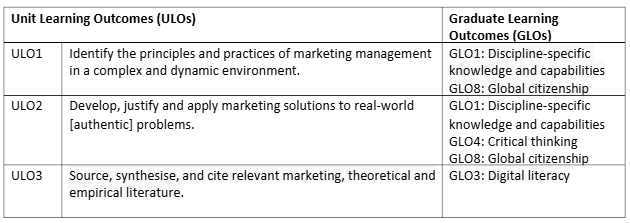MMK101 Marketing Fundamentals T1 Assessment 1 Brief | DU
| Category | Assignment | Subject | Marketing |
|---|---|---|---|
| University | Deakin University | Module Title | MMK101 Marketing Fundamentals |
| Assignment no.: | Assessment 1-Segmentation, Targeting, Differentiation & Positioning Strategy | Trimister: | T1, |
| Count Words: | 750 words | Academic year: | 2025 |
MMK101 Learning Outcomes
This task allows you to demonstrate your achievement towards the Unit Learning Outcomes (ULOs), which have been aligned to the Deakin Graduate Learning Outcomes (GLOs). Deakin GLOs describe the knowledge and capabilities graduates acquire and can demonstrate on completion of their course. This assessment task is an important tool in determining your achievement of the ULOs. If you do not demonstrate the achievement of the ULOs, you will not be successful in this unit. You are advised to familiarise yourself with these ULOs and GLOs as they will inform you on what you are expected to demonstrate for successful completion of this unit.

Description
Purpose
This task provides you with opportunities to learn marketing knowledge (GLO1 & ULO1, ULO2); relevant skills (GLO4 & ULO2; GLO3 & ULO3) and understand the complexity faced by organisations operating in dynamic environments and industries (GLO8 & ULO1, ULO2). Marketing knowledge and specific skills are required in the study and practice of marketing in organisations. By completing this task, you will develop your skills in researching, understanding, applying, evaluating, and presenting information required to meet the requirements of this assessment task.
Context/Scenario
The Management of Gourmet Garden wish to enlist your expertise as a marketing consultant with the task of crafting a comprehensive marketing plan (Assessment 1 and Assessment 2) to address their 2025 priorities. The overall objectives are to:
- Increase product trial of the Gourmet Garden brand.
- Establish Gourmet Garden as a leader in the ‘ready to use’ fresh herbs market with a focus on ‘fresh convenience’.
- Improve market penetration and increase market share.
In Assessment 1, you are to provide an analysis of the fresh herbs market and develop the ‘ideal’ target market and positioning strategy for the Gourmet Garden brand using the Segmentation, Targeting, Differentiation and Positioning framework.
Achieve Higher Grades with MMK101 Assignment Solutions
Order Non-Plagiarised Assignment
Assessment 1 objectives are as follows:
- Analyse the fresh herbs market in Australia to provide Gourmet Garden with insights into key industry indicators and relevant macro and micro factors. This analysis will support the Gourmet Garden management team in making informed decisions aligned with their 2025 priorities.
- Identify the most attractive target market for Gourmet Garden using relevant segmentation variables and characteristics, focusing on consumers who need fresh, convenient, ready-to-use herbs and are likely to trial the brand. Develop a detailed consumer persona/profile that represents the ideal Gourmet Garden customer.
- Determine the Gourmet Garden brand’s competitive advantage (differentiation) in the Australian marketplace and develop a positioning statement to reflect its competitive advantage.
- Graphically depict the Gourmet Garden brand’s differentiation strategy in the Australian marketplace using a positioning/perceptual map framework. The positioning map format is provided in the assignment 1 template.
Specific Requirements
Assessment 1 is a 750-word business report using the template provided. Please do not deviate from the business report structure provided.
Note that the word count included in brackets in the following guidelines is a suggestion only. Definitions and direct quotations are NOT required in this assessment task. Relevant images, tables and graphs are required throughout your discussion to support your narrative. These images must be placed within the discussion, not at the end of the paragraph. This is the norm for business reports. Appendices are NOT required, and will not be assessed, if included.
Background
(25 marks = 5 marks for 1.1. and 20 marks 1.2., 300 words overall for section 1)
Company Overview
- Provide a brief overview of the McCormick company and the Gourmet Garden brand.
Industry Analysis
- Conduct an industry analysis of the fresh herbs market in Australia, addressing the current industry situation – key industry trends, indicators and relevant macro and micro factors. Key industry data and the inclusion of tables, images and/or graphs are mandatory in this section.
Consumer Market Segmentation
(15 marks for section 2 – the table is not included in the word count.
Segmentation
In a segmentation table (as demonstrated in the MMK101 seminar), develop three (3) consumer market segments for Gourmet Garden that require fresh, convenient, ready-to-use herbs and are likely to trial and ultimately purchase the Gourmet Garden brand. Keywords should only appear in the table, e.g., 18–34-year-old females. The focus is on the consumer market, not business markets, e.g., restaurants. Do not provide a discussion in this section, as this appears in section 3.
Target Market and Consumer Profile
(20 marks = 10 marks each for 3.1 and 3.2, approximately 250 words for section 3 – the consumer profile is not included in the word count.
Target Market
- Select ONE consumer market segment from your segmentation table in section 2, which you believe is the most attractive for Gourmet Garden to target. Justify your selection by providing a rationale behind the choice of segmentation variables and providing an estimated target market size and demand. Support your justification with evidence from credible sources such as industry reports, journal articles, and population statistics.
Consumer Profile/Persona
- A consumer persona/profile is a semi-fictional customer description of your ideal customer. Based on your findings from sections 2, 3.1 and from your research (e.g., demographics, psychographics, lifestyle, motivations and consumer habits and behaviour), develop a detailed persona/profile that represents the ideal consumer for the Gourmet Garden brand. A consumer persona template has been provided in the assignment template.
Differentiation and Positioning
(30 marks = 10 marks each for 4.1, 4.2 and 4.3, approximately 200 words overall for section 4)
Differentiation Strategy
- Using the two (2) most appropriate of the five (5) bases of differentiation, explain and justify how you would differentiate Gourmet Garden’s market offering in the Australian marketplace (i.e., what is Gourmet Garden’s potential point of difference or competitive advantage?).
Positioning Statement
- Provide a positioning statement for the Gourmet Garden brand.
Positioning Map
- Using a perceptual/positioning map diagram, depict your differentiation strategies (as developed in 4.1), which demonstrate Gourmet Garden’s competitive advantage relative to the competition in the Australian fresh herbs market and justify your positioning.
Important Information – Essential Reading
Submission
Please follow the word template for assessment 1, which is provided for you on Cloud Deakin in the assessment tile or content page. The template structure provides you with experience in presenting professional business reports. You must complete the artificial intelligence usage form.
Work or parts of work that you have submitted in the past for any assessment task, irrespective of the unit, cannot be resubmitted for assessment in this unit, MMK101 Marketing Fundamentals, without prior permission from the Unit Chair.
Your report is a business report, not an essay. Please use a standard font (such as Times New Roman or Arial Narrow), at 12-point, with 1.5 minimum spacing between lines, to enhance the legibility for markers. All images and tables should be included in the body of the report. Appendices are not required. If you include an appendix, the content will not be marked.
N.B. For this business report in MMK101, the following are not included in your word count:
- Title page
- Artificial Intelligence form
- Table of contents
- Figures (including the consumer profile), tables (including the segmentation table), charts (and related captions), unless used as part of the discussion
- Reference list
Please note! All in-text citations and headings are INCLUDED in the word count
In MMK101 Marketing Fundamentals, we use the APA7 referencing protocols.
The assessment task must be in a Microsoft Word Document for marking purposes. PDFs will not be accepted. Microsoft Word is available to students free of charge.
You must submit your assignment in the Assignment Dropbox in the Unit CloudDeakin site on or before the due date. When uploading your assignment, name your document using the following syntax: <your surname_your first name_your Deakin student ID number_[unitcode].doc (or ‘.docx’). For example, ‘Jones_Barry_123456789_MMK101’.
Submitting a hard copy of this assessment task is not required. You must keep a backup copy of every assignment you submit until the marked assignment has been returned to you. In the unlikely event that one of your assignments is misplaced, you will need to submit your backup copy.
Any work you submit will be checked by electronic or other means to detect collusion and/or plagiarism and to authenticate work. Turnitin checks that you have not unwittingly used the work of others (i.e., academic and trade authors, etc.) without due recognition. There are penalties for plagiarism at this university that are described in the following Student Rights and Responsibilities . This link also provides more information about academic misconduct, special consideration, extensions, and assignment feedback. To check your draft before submission for similarity, please go to the Unit’s Cloud Deakin site under the student help widget:
Marking and feedback
The marking rubric indicates the assignment criteria for this task. It is available in the CloudDeakin unit site in the Assignment folder. Criteria act as a boundary around the task and help specify what assessors are looking for in your submission. The criteria are drawn from the ULOs and align with the GLOs. You should familiarise yourself with the assignment criteria before completing and submitting this task.
Students who submit their work by the due date will receive their marks and feedback on CloudDeakin approximately 15 working days after the submission date.
Extensions
Extensions can only be granted for exceptional and/or unavoidable circumstances outside of your control. Requests for extensions must be made by 8.00 pm on the submission date using the online Extension Request form under the Assessment tab on the unit CloudDeakin site. All requests for extensions must be supported by appropriate evidence (e.g., a medical certificate in the case of ill health). Extensions without supporting evidence will not be approved.
Referencing and Academic Integrity
In MMK101 Marketing Fundamentals, we use the APA7 referencing protocols.
In-text referencing, acknowledging your sources of information (including Artificial Intelligence platforms), is mandatory throughout your report using the APA7 referencing protocols. Failing to acknowledge your sources is a breach of academic integrity.
Deakin takes academic integrity very seriously. It is important that you (and if a group task, your group) complete your work in every assessment task. Any material used in this assignment that is not your original work must be acknowledged, e.g., (author surname or company name, year of publication), as such and appropriately

